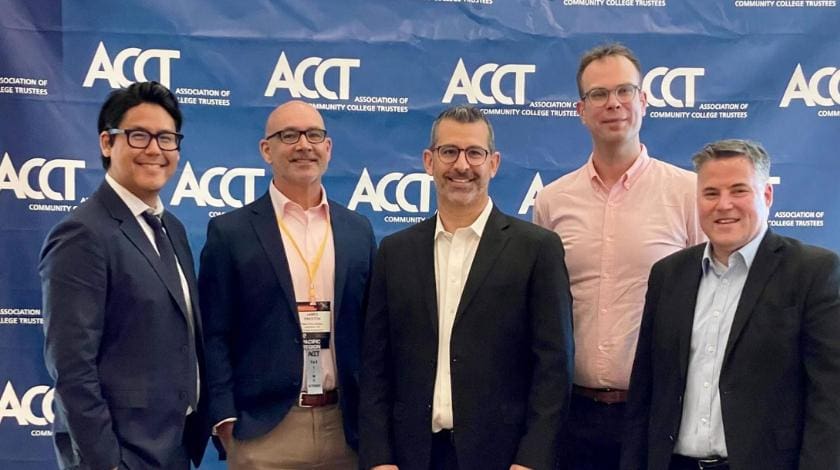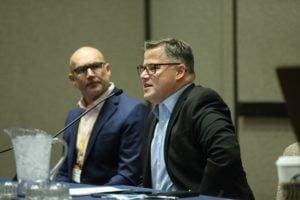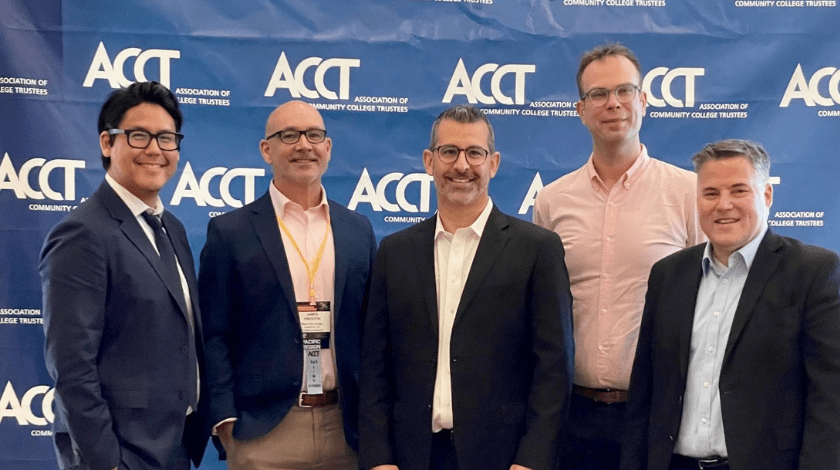The ACCT Leadership Congress is the largest professional development opportunity for community college trustees, presidents, and other thought and policy leaders.

From left to right: Phillip Kim (CEO, Michelson 20MM Foundation), James Preston (President, West Hills College Lemoore), James Toscano (President, Partners for College Affordability and Public Trust), Ryan Erickson-Kulas (Director of Programs & Operations, Michelson 20MM Foundation), and Geoffrey Baum (Executive Director, Michelson Philanthropies).
By Ryan Erickson-Kulas
Last week the Michelson 20MM Foundation had the pleasure of sponsoring, attending, and presenting with a grantee at the Association of Community College Trustees (ACCT) 2021 Leadership Congress. Held in San Diego, this event is the largest professional development opportunity for community college trustees, presidents, and other thought and policy leaders. This year, more than 1,000 attendees from across the country gathered to share their experiences, network, and expand their knowledge of the community college sector. Themed “Community Colleges Advancing Diversity, Equity, and Inclusion,” the event included sessions on how leaders can continue to enhance DEI initiatives at their campuses.
Entrepreneurship for Students of Color
A highlight was a session presented by the San Diego Community College District, the host district for this year’s conference, about emphasizing entrepreneurship in curricula while also providing opportunities for students of color and students from underinvested communities to engage in experiential learning via entrepreneurship. The district runs the Regional Entrepreneurship Center (REC) Innovation Lab at Miramar College, a community business incubator dedicated to diversity, equity, and inclusion, and to helping founders solve problems by launching high-growth startups.
One student-led company that emerged from the REC Innovation Lab was Cromchies, which was founded by two female immigrants from Mexico. Unable to find the wafers they snacked on in Mexico in the United States, the two students created Cromchies to bring a taste of their home to U.S. consumers in the form of a healthy, convenient snack.
Prioritizing Student Basic Needs
On Friday, the Michelson 20MM team attended breakout sessions focused on how to address the basic needs of students. Black Hawk College (BHC) in Illinois shared how they started and grew a food pantry to ensure that students were free to think about their classes, not basic needs. After launching the program in 2018, BHC experienced growth as student groups started their own food donations and drives. With this growth came logistical issues, so the school secured a partnership with the River Bend Food Bank that allowed them to include perishable foods, offer a wider variety of food, and provide more distribution dates. A partnership with the BHC Police Department enabled students to access the food pantries 24 hours a day. Since its launch, BHC has assisted nearly 1,3000 students.
Another presentation on basic needs focused on Michigan-based Lansing Community College’s work around menstrual equity. Access to menstrual products is an equity-related issue as two thirds of low-income U.S. women can’t afford menstrual products, which often top the list of needs at shelters. Studies show 46% of women have skipped class due to lack of access. Five states (CA, NY, IL, NH, and VA) have passed legislation requiring schools to provide free menstrual products to students, which has a minimal impact on budgets because implementation only costs schools $4.67 per female student annually. The Board of Trustees at Lansing Community College launched a pilot program in 2019 with $5,000 in funding and shared how a minimal investment provided a more equitable learning environment.
Affordability and Access
On the final day of the conference, we joined our grantee, Partners for College Affordability and Public Trust, and a panel of open educational resources (OER) experts to share how trustees can promote affordability practices on their campuses. The panel included:
-
Geoffrey Baum, Executive Director, Michelson Philanthropies & Michelson Center for Public Policy and former California Community Colleges Board of Governors member
-
Lisa Petrides, Trustee, San Mateo County Community College District, CA
-
James Preston, Interim President, West Hills College Lemoore, CA
-
James Toscano, President, Partners for College Affordability and Public Trust

Michelson Philanthropies Executive Director Geoffrey Baum (right) and West Hills Lemoore Interim President James Preston answered questions from the audience during their presentation on OER. Photo by ©️2021 Keith Weller for the Association of Community College Trustees.
The session focused on a study of West Hills College Lemoore’s textbook affordability initiative and the role its governing board played in driving implementation of this innovative, cost-saving measure for students. In 2016, the board adopted an audacious initial policy of developing OER for “at a minimum, 80% of all degree-applicable programs in the first year.” This bold policy containing a lofty, measurable goal helped fuel the school’s “OERevolution,” which, at West Hills College Lemoore where the initiative originated, has resulted in $6 million of savings for students, $3 million in just the last two years. This fall at West Hills College Lemoore, roughly 50% of courses will be delivered via OER or as low textbook cost courses (defined as less than $40). The program has been so successful that the physical bookstore became obsolete and the location was repurposed to house a career center and support services for military students.
“If we say we’re going to do something, then we’re going to get it done. No excuses,” said West Hills Community College District board member Nina Oxborrow. The panel discussed how college board members and staff should operate by a guiding principle: textbook costs are a financial barrier to student success that must be overcome; therefore, the proliferation of OER within a college requires champions at all levels of the institution.
“If we say we’re going to do something, then we’re going to get it done. No excuses.” —Nina Oxborrow, West Hills Community College District board member
Another session focusing on the importance of OER usage was presented by Chippewa Valley Technical College (CVTC) in Wisconsin. One of two higher education institutions that were awarded a $2.5 million OER grant from the Department of Education in 2019, CVTC has partnered with the 15 other technical colleges in the Wisconsin Technical College System to develop open textbooks for the statewide nursing program. During the 2020-2021 school year, CVTC students saved an estimated $490,000 by the use of these resources. Additionally, both faculty members and students who used OER felt that the quality of instructional materials were as good, if not better than traditional commercial textbooks. Indeed, students in OER courses performed on par with or above students in non-OER courses.
The ACCT Leadership Conference served as a space to learn and better understand how trustees can support community college students in their educational journey. We look forward to putting our learnings into practice as our foundation seeks to serve underrepresented, post-secondary students.
Michelson 20MM is a private, nonprofit foundation seeking to accelerate progress towards a more just world through grantmaking, operating programs, and impact investing. Co-chaired and funded by Alya and Gary Michelson, Michelson 20MM is part of the Michelson Philanthropies network of foundations.

